Pythian Postcards: Selamat Datang Ke Singapore!
Editor’s Note: Welcome to the second post in our “Pythian Postcards” series! Post one came to us from Toulouse, France. Today, Pio Balistoy takes us to Singapore:
I usually stick to SQL Server when writing for the Pythian blog because that’s what I know best. However, as I celebrate my tenth year with Pythian, I thought it would be a great time to look back, so here we are. As you all know, Pythian Services had remote employees around the globe long before it was cool to telecommute. My team, for example, is composed of great SQL Server professionals from Pakistan, India, New Zealand, Guatemala, USA, Canada, and last but not the least my home — Singapore. I have been living here for more than fourteen years now, and I am as amazed and proud of it as when I first moved here. That’s why it is my pleasure to highlight this “Little Red Dot” here in Pythian Postcards.
Q: Where are you located?
A: Singapore is an island city-state right at the tip of the Malaysian Peninsula. No, we’re not part of China. We were part of Malaysia, and were once a British colony, but we’ve been an independent country for over 55 years now. Fun fact: Singapore is the nineteenth smallest country in the world. You can probably get from one end of the country to the other end in an hour. But don’t let the size deceive you; we have one of the world’s strongest economies and highest GDPs.
The country has also made good use of its land and done careful city planning. Even though it’s small, Singapore doesn’t have the cramped over-populated feel of many modern cities. Because the country is peppered with parks and greenery you easily forget how small it is. What I love most about Singapore is how safe and organized everything is. You can go out any time of day or night and not worry about a thing.
Q: How did you end up there?
A: I am a Filipino — born and bred in the Philippines. Back in 2009, Singapore aggressively hired experienced foreign talents to keep up with the growth in the country’s IT industry. A lot of my friends and colleagues moved here and couldn’t stop talking about it as a great place to work and live. At first, I wasn’t interested in living anywhere else than the Philippines. I grew up with my father working overseas and away from the family, so I actively tried to avoid following the same route. In the end, curiosity got the best of me, and Singapore has impressed and surprised me from the day I landed here.
Q: What do you do at Pythian, and what path brought you here?
A: If you ask me now, I bleed SQL. For my entire professional career, I have been a DBA. I started as an Oracle DBA in Accenture, but we were already migrating off Oracle and moving to SQL Server when I joined. Since then, I’ve been administering SQL Server for more than 17 years. I’ve worked with all versions of SQL Server from SQL 6.5 to Azure SQL along my professional journey.
I’ve been with Pythian for the past ten years. I am currently a Lead Data Platform Consultant. I’m part of an awesome team of very experienced SQL Server consultants from around the world. We work to make sure our clients’ databases are in tip-top shape and highly available. When I joined Pythian, working remotely was still an alien concept in Southeast Asia. One of my good friends, and former Microsoft MVP, shared the opportunity and roped me in. Then, I met the folks in my team, and their knowledge and experience blew me away. Not just the SQL team, but the whole organization. It felt like almost everyone was either an Oracle ACE or a Microsoft MVP.
Fresh out of the university, I never thought I would be in the IT industry. I am actually a licensed electronics and communications engineer. I always thought I’d be designing wafers, circuits or logic in the semiconductor industry. Either that, or commissioning telecommunication towers. But life gave me SQL and I ran with it. I haven’t looked back since. Although truth be told, I still doodle transistor biasing circuits when I get bored at meetings and no one is looking.
Q: What kind of accommodation do you live in?
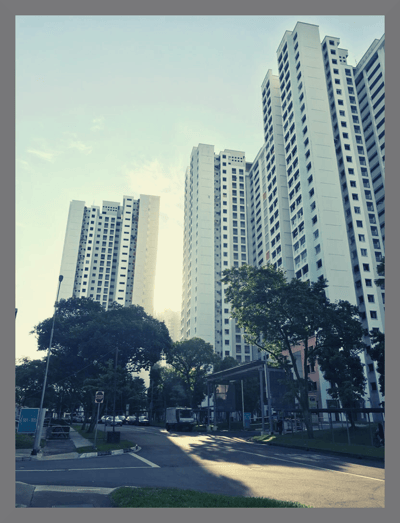
A: Singapore is a very expensive city to live in. We are always near the top of lists of the most expensive cities in the world. Here, the land is more or less state-owned. The government manages its use and leases it to developers to create properties and infrastructures. Landed houses here are for the ultra-rich, with the median price at just a hair under SGD 4M (USD 3M). The rest of the population lives in either condominiums or HDB (Housing and Development Board) flats, which are like government-developed condominiums. I live in a three-bedroom HDB flat. There are some low-rise HDB buildings but most of them are high-rises like the ones pictured above. I live in the building on the right.
You’d think a small country like Singapore would feel cramped. But they’ve managed to use the land efficiently without making you feel trapped in an urban jungle. Because the whole island is peppered with parks, playgrounds, sports facilities and community centers it doesn’t feel claustrophobic. There’s even a connected bike path from one corner of the country to the other side. We call it the Park Connector Network. You can cycle your way across the country safely and through greenery.
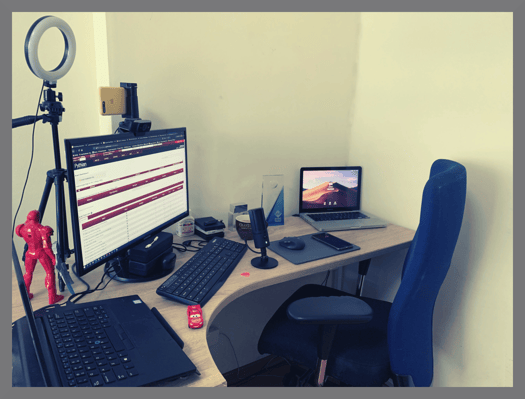
Here’s my corner office, excuse the mess. I share the study room with the real student in our household. One corner is mine, and the rest is my kid’s study area. Which meshes up well since I’m almost finished with work when he comes back from school. He can shoot me questions about his homework. By the time I have meetings at night he’s already outside playing, or sleeping.
Q: What are your hobbies / non-work pastimes?
A: I have two growing sons, so I do not have a hobby … or are my children my hobbies? When I’m not working, I’m likely building Lego, playing Minecraft, watching animes or playing ball with my sons. I used to take photos like the one below. But my Nikon D80 has been collecting dust for a while now. I’ve traded it for a Nerf gun.
Once in a while, I do get some peace and quiet when my children are off playing on their own. When that happens, I pick up my acoustic guitar and play to my heart’s content. Not George-Harrison level guitar, just your campfire guitarist or weekend garage band kind of level. I like to bust up some old songs from the 90’s. If I’m lucky enough, and my wife is also not busy with anything, she’ll be on the piano and I’ll be playing along on the guitar.
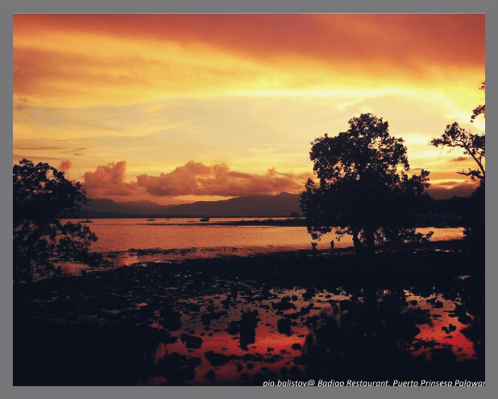
Badjao restaurant – Puerto Prinsesa, Palawan, Philippines
Q: What do you consider to be your biggest achievement to date – professional
or personal?
A: Success is what you make it. I’ve always been proud of my story and where I came from. It’s easy to claim it as my achievement, but truth be told I stand on the shoulders of giants. If you look into the heart of it, my biggest achievement is having two great parents. I wouldn’t be where I am right now — I wouldn’t be a Filipino Microsoft MVP for Data Platform living in Singapore — if not for them. I’ll explain this in more detail, but I’m warning you; it’s going to get personal, so you can stop reading here if you want. You’ll miss a good story though.
Foundational Achievements:
I grew up in the slums of Makati, at 1888 Eureka Street. Picture small shanties piled on top of each other, connected by wooden planks on top of a dead river, that also doubled as the sewage for the entire neighborhood. Today the area is called Coryville after then Philippine President Corazon “Cory” Aquino bought the land and helped provide a more decent home for the residents. Our house was no bigger than 10 square meters. The living room was also the dining room, and the space turned into the bedroom at night. The kitchen was off to the side and the toilet was just a hole in the floor that went straight to the river.
We were surrounded with poverty, yes, but we were also full of hope. My parents taught us to be content, whether we had more than we needed, or we did not have enough. They never left us wanting. Both my parents never finished school. Not because they did not strive to, or want to, but because they could not afford to. For them education was important and worth more than anything. So, they worked hard to make sure their children had what they did not. My father worked his way up from being a gas attendant while my mother took care of the kids and the house.
Do you know those little pocket sewing kits you see in hotels? We — my mom and my siblings — used to make those. We spooled the thread; 36 turns per color. For each one we finished we earned ten centavos. It was something to supplement our daily needs.
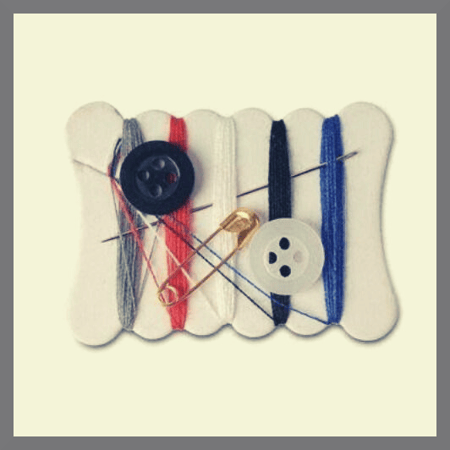
My father worked hard and put himself through trade school so he could move up and become a proper mechanic. He took pride in everything he did, and soon he was the best mechanic they had. He was so good that the owners insisted that he go with them to the US when they wanted to bring their business abroad. That made life financially easier for us, but also meant a huge sacrifice for my parents. It was the late 80’s so the only form of communication they could have was through letters. They lived apart for years — my father worked in the US for twelve years straight — I never heard them complain. All I heard from them was, “Study hard, this is the only treasure we can leave you.”
We saw the sacrifices my parents had to make to be able to give us the life we had. I owe it to them to persevere. When I reached secondary, I was fortunate to be part of the first secondary science school in Makati City. The Makati government provided outstanding state-of-the-art education and a monthly allowance for the students. I had the same luck when I entered the university. The Department of Science and Technology of the Philippine Government granted me a scholarship, and also provided a monthly stipend.
Through the education my parents provided me, I was able to build a good career. Through the virtues they instilled, here I stand. Given the same situation with a different set of parents, I may have not been able to make it where I am. So having parents to keep me on the straight and narrow is my greatest achievement.
Microsoft MVP Award:
Microsoft gives the Microsoft MVP award to outstanding individuals who make a difference in the technical community. I earned this a year ago for my contributions to the Data Platform community based on my speaking engagements to user groups and conferences in Singapore, Philippines and Australia over the last several years.
The idea to pursue this award came from Pythian. I’m more than grateful to be part of a company that values community and personal development beyond actual work. Pythian is filled with Microsoft MVPs and I saw the value of the award through my colleagues here.
Still, I can trace the inspiration to start speaking back to my parents. My mother was diagnosed with cancer 2017. With me living in Singapore and them living in the Philippines, spending precious time together was difficult. I am fortunate that Pythian allows its employees to work remotely. My family flew home whenever possible during school breaks, and I worked from Manila while spending time with my mother. With school-going children, those chances were still few and far between. So I grabbed every opportunity to speak in the Philippines. This enabled me to “work” and spend some more time with my mother.
Unfortunately her cancer won out in early March 2018. I decided, since speaking had given me more time with my mother, I would show my gratitude by continuing to speak. My goal was to be an MVP before my mother’s birthday in October — I became an MVP on November 1. I began pursuing the award as a way to meet my family’s immediate needs, but as I gave back, and met really generous and outstanding individuals in various user groups, my motive switched to the intended focus: community.
Some people seek awards, titles or recognition. Others would just be grateful for running water from a faucet. I used to fetch water by the gallon from an open water pipe two blocks from our house. For me, having a faucet in my own home is an achievement. I believe in celebrating the little things. It all depends on perspective, but for me real success is finding contentment.
Improving yourself and your situation is the success. Being able to share that with the people around you is the achievement. Success is what you make it.
We hope you enjoyed this glimpse into life at Pythian. Don’t forget to sign up for next month’s feature.
You May Also Like
These Related Stories
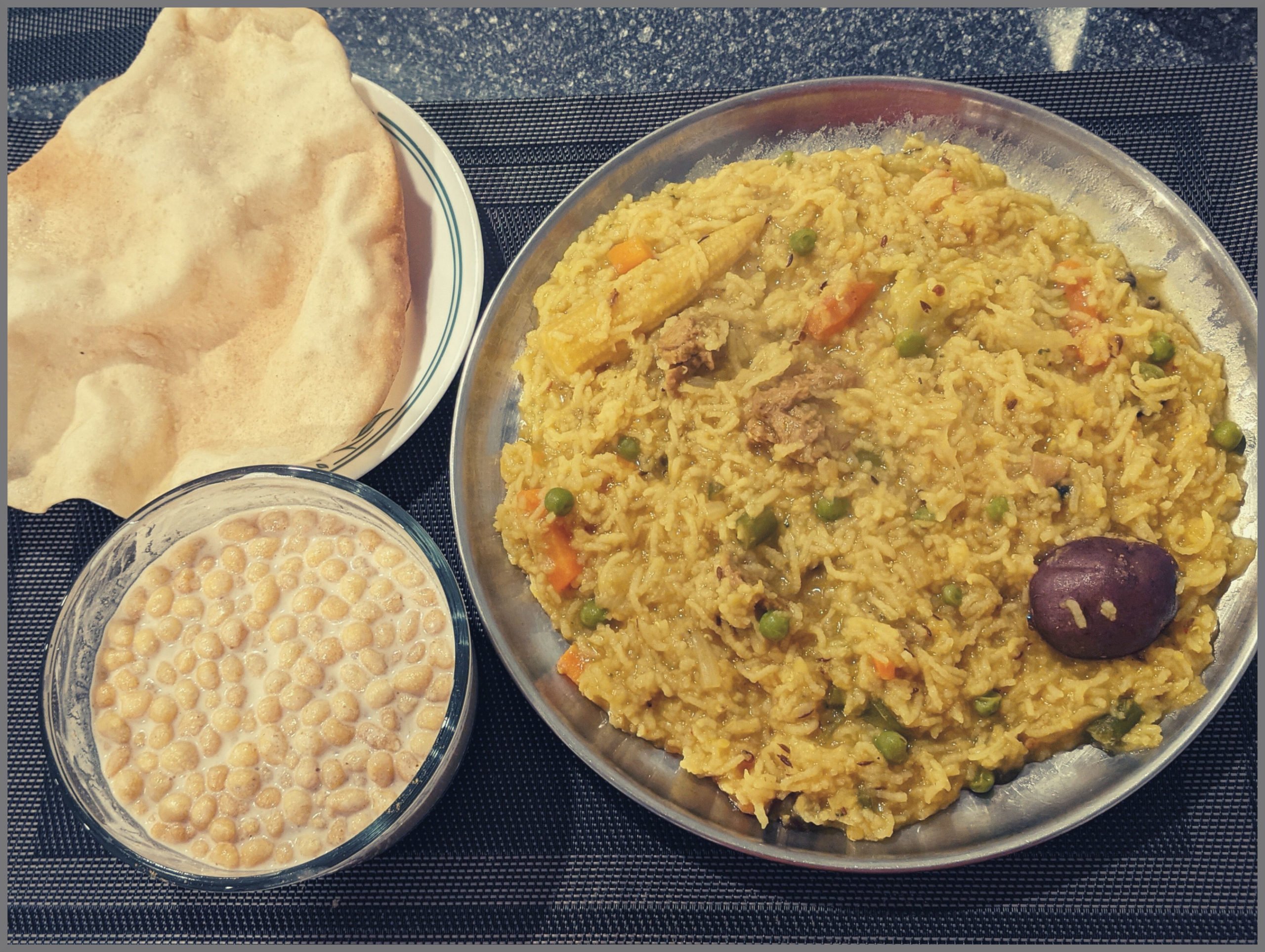
Pythian Postcards: Markham, Ontario
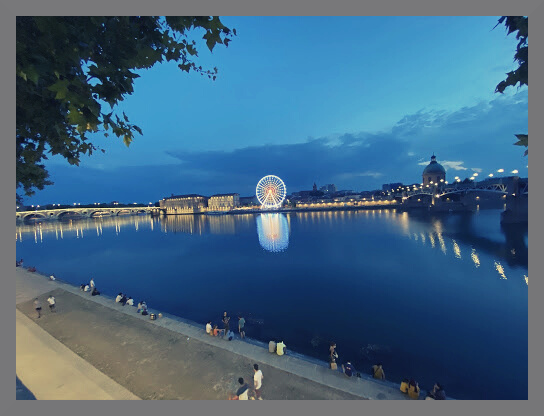
Pythian Postcards: Toulouse, France … by way of Mexico
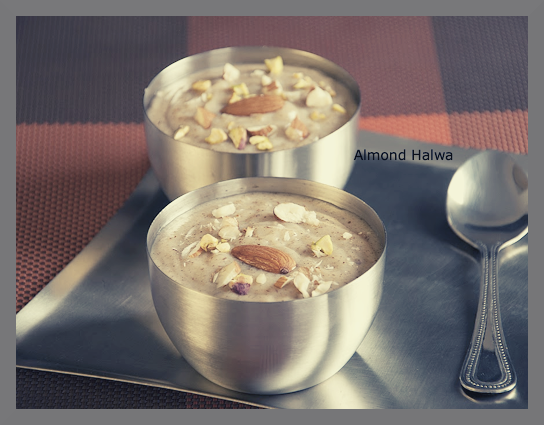

No Comments Yet
Let us know what you think